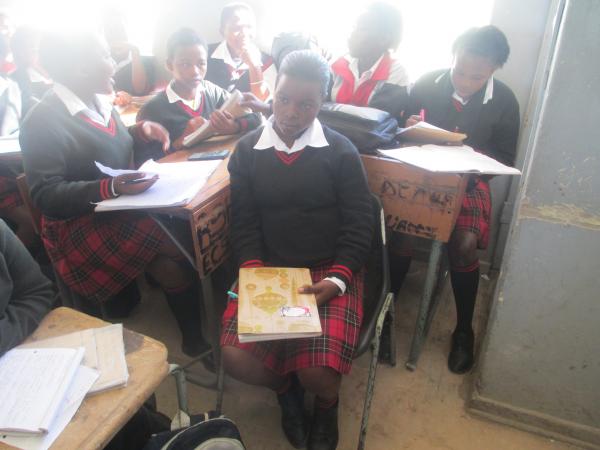Writers and leaders talk about terrible conditions in schools

Last week GroundUp’s Mary-Anne Gontsana reported the terrible state of schools in the Eastern Cape she saw on the “solidarity visit” organised by Equal Education. Today she describes the impressions of some of the well-known South Africans who also participated.
Last Monday Archbishop Thabo Makgoba hosted a press conference at his chambers in Cape Town explaining that he was taking part in the solidarity visit organised by Equal Education to Eastern Cape schools. The purpose of the visit was to raise awareness of the school infrastructure crisis and the need for minimum norms and standards for school infrastructure. Other participants included writers Elinor Sisulu, Zakes Mda, Sindiwe Magona and Njabulo Ndebele, Human Rights Commissioner Lindiwe Mokate, the University of Cape Town’s Pierre de Vos and the University of Witwatersrand’s Professor Graeme Bloch.
The solidarity visit took place between 23 and 26 April 2013 in the Mthatha region, Libode Mega District, Coffee Bay and Mqanduli in the Eastern Cape.
See Mary-Anne Gontsana’s other stories on the solidarity visit:
The visit was held in the lead up to Basic Education Minister Angie Motshekga publishing the final Minimum Norms and Standards for School Infrastructure regulations on 15 May. Equal Education has campaigned for this for two years and only after the organisation started legal action did Motshekga agree to publish regulations. The regulations will set minimum standards for infrastructure that all schools will have to meet on sanitation, electricity, water, class sizes, security, libraries and computer centres, amongst other things.
On Wednesday, the first day of the visit, faced with the awful conditions we saw, the Archbishop described it as the walk of witness to see the challenges that children face in the Eastern Cape. “We must look, see, let the situation speak. We must bring this education crisis forward. Don’t be overwhelmed by the enormity of it.”
The first school that was visited was Putuma Junior Secondary School which has a massive problem of overcrowding. Described by Equal Education as one of the best schools before the visit, Zakes Mda responded, “If this is one of the best schools, I’m afraid to see the worst.”
Elinor Sisulu asked, “What is going on in our community?” She continued, “There are cleaners employed full time in this school but it is filthy. There is a problem with maintenance in this school. I have also seen that learners are not reading enough. Even if they do read, they do not know the writers because the output of writers is not put in schools. There is an issue of reading and self-confidence among the learners.”
Sea View Senior Secondary School was no better, with it having only eight educators instead of the 15 that it needs. Only two teachers are permanent.
A heartbreaking moment for storyteller Sindiwe Magona was seeing the toilets in Nyangilizwe Senior Secondary School. “I have seen many terrible toilets in my life but none like this. Have you seen them? Well, I did, and I cried. Yes, I cried. This is not right. You cannot compare that to anything. I keep hearing people saying that it is like apartheid all over again. No, this is worse than apartheid. At least during the apartheid days you knew that as a black person you were a servant, but this, I can’t even explain it. It is the worst thing I have ever seen.”
Executive director of the Nelson Mandela Institute, Kimberley Porteus, said South Africa was under-performing compared to our neighbours. “Our rural schools are not set up to work. Teachers are absent and there is a textbook issue. Most teachers see grades 1 to 3 as child-care and not teaching. There is no reading taking place before grade 4 which makes it hard for learners to catch up. They don’t understand that in grades 1 to 3 is when the brain explodes; you want to know so many things.”
A report by researcher and PhD student Nicholas Spaull, who also participated on the solidarity visit, said that there were two important constraints to progress in education in SA: lack of accountability and lack of capacity. “Lack of accountability means that there are no tangible consequences for non-performance, and lack of capacity means that teachers or administrators or managers, lack the ability or skills to fulfill their job descriptions. We haven’t reached the level of equality in education.”
Graeme Bloch said we needed to make education liberating. He said there was this fixed mentality that children who come from poor rural schools had no chance of making it in future compared to a child who goes to a posh school in the suburbs.
Archbishop Makgoba said the main things that stood out for him were overcrowding, filthiness and the poor state of water and sanitation. “Even with these problems, the school governing bodies and the communities are trying. In two of the schools there was proper learning taking place. I hope the first change will be awareness. I hope that the solidarity visit brings the media to show the urgency and extent of the crisis. We hope it will irritate the MEC and Minister and compel them to action and publish a positive norms and standards document.” He also said that not only government, but businesses and churches should also help fix the problems in our schools.
Support independent journalism
Donate using Payfast

Don't miss out on the latest news
We respect your privacy, and promise we won't spam you.
Next: Khayelitsha toilet contractors not delivering
Previous: Why do learners have to use toilets that look like this?

This article is licensed under a Creative Commons Attribution-NoDerivatives 4.0 International License.
